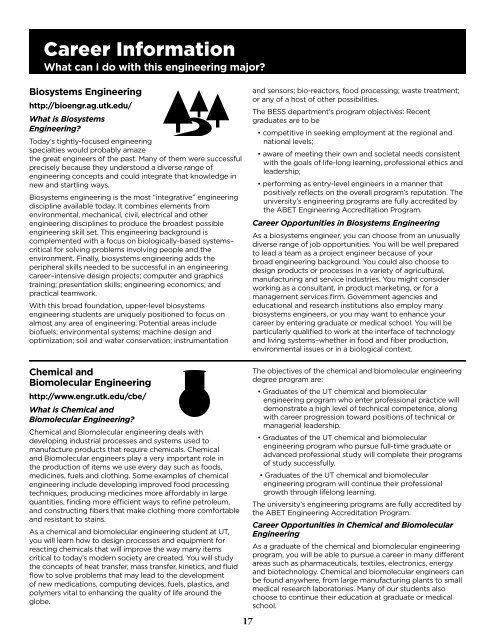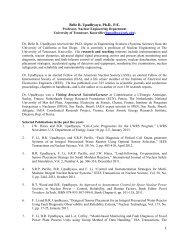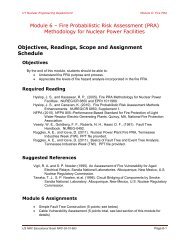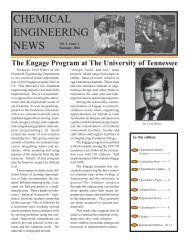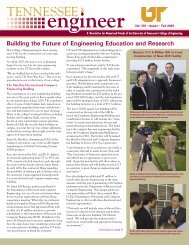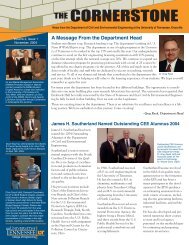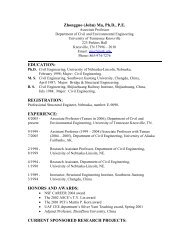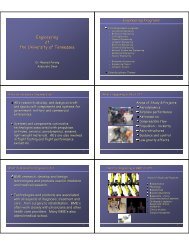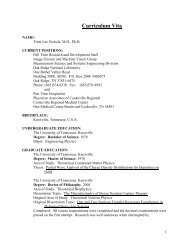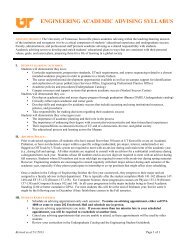Student Guidebook 2013 (PDF) - College of Engineering - The ...
Student Guidebook 2013 (PDF) - College of Engineering - The ...
Student Guidebook 2013 (PDF) - College of Engineering - The ...
You also want an ePaper? Increase the reach of your titles
YUMPU automatically turns print PDFs into web optimized ePapers that Google loves.
Career Information<br />
What can I do with this engineering major?<br />
Biosystems <strong>Engineering</strong><br />
http://bioengr.ag.utk.edu/<br />
What is Biosystems<br />
<strong>Engineering</strong>?<br />
Today’s tightly-focused engineering<br />
specialties would probably amaze<br />
the great engineers <strong>of</strong> the past. Many <strong>of</strong> them were successful<br />
precisely because they understood a diverse range <strong>of</strong><br />
engineering concepts and could integrate that knowledge in<br />
new and startling ways.<br />
<br />
discipline available today. It combines elements from<br />
environmental, mechanical, civil, electrical and other<br />
engineering disciplines to produce the broadest possible<br />
engineering skill set. This engineering background is<br />
<br />
critical for solving problems involving people and the<br />
environment. Finally, biosystems engineering adds the<br />
peripheral skills needed to be successful in an engineering<br />
<br />
training; presentation skills; engineering economics; and<br />
practical teamwork.<br />
With this broad foundation, upper-level biosystems<br />
engineering students are uniquely positioned to focus on<br />
almost any area <strong>of</strong> engineering. Potential areas include<br />
bi<strong>of</strong>uels; environmental systems; machine design and<br />
optimization; soil and water conservation; instrumentation<br />
and sensors; bio-reactors, food processing; waste treatment;<br />
or any <strong>of</strong> a host <strong>of</strong> other possibilities.<br />
<strong>The</strong> BESS department’s program objectives: Recent<br />
graduates are to be<br />
<br />
national levels;<br />
<br />
with the goals <strong>of</strong> life-long learning, pr<strong>of</strong>essional ethics and<br />
leadership;<br />
<br />
positively reflects on the overall program’s reputation. <strong>The</strong><br />
university’s engineering programs are fully accredited by<br />
the ABET <strong>Engineering</strong> Accreditation Program.<br />
Career Opportunities in Biosystems <strong>Engineering</strong><br />
As a biosystems engineer, you can choose from an unusually<br />
diverse range <strong>of</strong> job opportunities. You will be well prepared<br />
to lead a team as a project engineer because <strong>of</strong> your<br />
broad engineering background. You could also choose to<br />
design products or processes in a variety <strong>of</strong> agricultural,<br />
manufacturing and service industries. You might consider<br />
working as a consultant, in product marketing, or for a<br />
management services firm. Government agencies and<br />
educational and research institutions also employ many<br />
biosystems engineers, or you may want to enhance your<br />
career by entering graduate or medical school. You will be<br />
particularly qualified to work at the interface <strong>of</strong> technology<br />
<br />
environmental issues or in a biological context.<br />
Chemical and<br />
Biomolecular <strong>Engineering</strong><br />
http://www.engr.utk.edu/cbe/<br />
What is Chemical and<br />
Biomolecular <strong>Engineering</strong>?<br />
Chemical and Biomolecular engineering deals with<br />
developing industrial processes and systems used to<br />
manufacture products that require chemicals. Chemical<br />
and Biomolecular engineers play a very important role in<br />
the production <strong>of</strong> items we use every day such as foods,<br />
medicines, fuels and clothing. Some examples <strong>of</strong> chemical<br />
engineering include developing improved food processing<br />
techniques, producing medicines more affordably in large<br />
quantities, finding more efficient ways to refine petroleum,<br />
and constructing fibers that make clothing more comfortable<br />
and resistant to stains.<br />
As a chemical and biomolecular engineering student at UT,<br />
you will learn how to design processes and equipment for<br />
reacting chemicals that will improve the way many items<br />
critical to today’s modern society are created. You will study<br />
the concepts <strong>of</strong> heat transfer, mass transfer, kinetics, and fluid<br />
flow to solve problems that may lead to the development<br />
<strong>of</strong> new medications, computing devices, fuels, plastics, and<br />
polymers vital to enhancing the quality <strong>of</strong> life around the<br />
globe.<br />
17<br />
<strong>The</strong> objectives <strong>of</strong> the chemical and biomolecular engineering<br />
degree program are:<br />
<br />
engineering program who enter pr<strong>of</strong>essional practice will<br />
demonstrate a high level <strong>of</strong> technical competence, along<br />
with career progression toward positions <strong>of</strong> technical or<br />
managerial leadership.<br />
<br />
engineering program who pursue full-time graduate or<br />
advanced pr<strong>of</strong>essional study will complete their programs<br />
<strong>of</strong> study successfully.<br />
<br />
engineering program will continue their pr<strong>of</strong>essional<br />
growth through lifelong learning.<br />
<strong>The</strong> university’s engineering programs are fully accredited by<br />
the ABET <strong>Engineering</strong> Accreditation Program.<br />
Career Opportunities in Chemical and Biomolecular<br />
<strong>Engineering</strong><br />
As a graduate <strong>of</strong> the chemical and biomolecular engineering<br />
program, you will be able to pursue a career in many different<br />
areas such as pharmaceuticals, textiles, electronics, energy<br />
and biotechnology. Chemical and biomolecular engineers can<br />
be found anywhere, from large manufacturing plants to small<br />
medical research laboratories. Many <strong>of</strong> our students also<br />
choose to continue their education at graduate or medical<br />
school.


